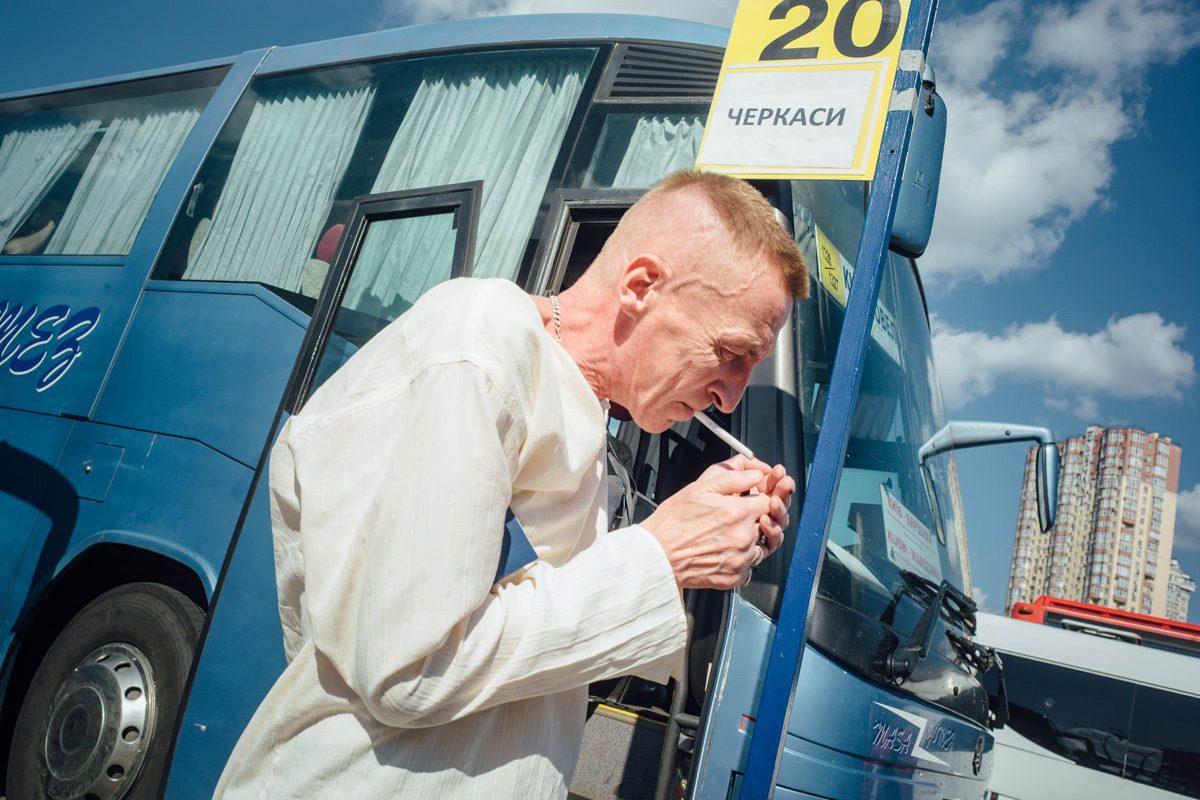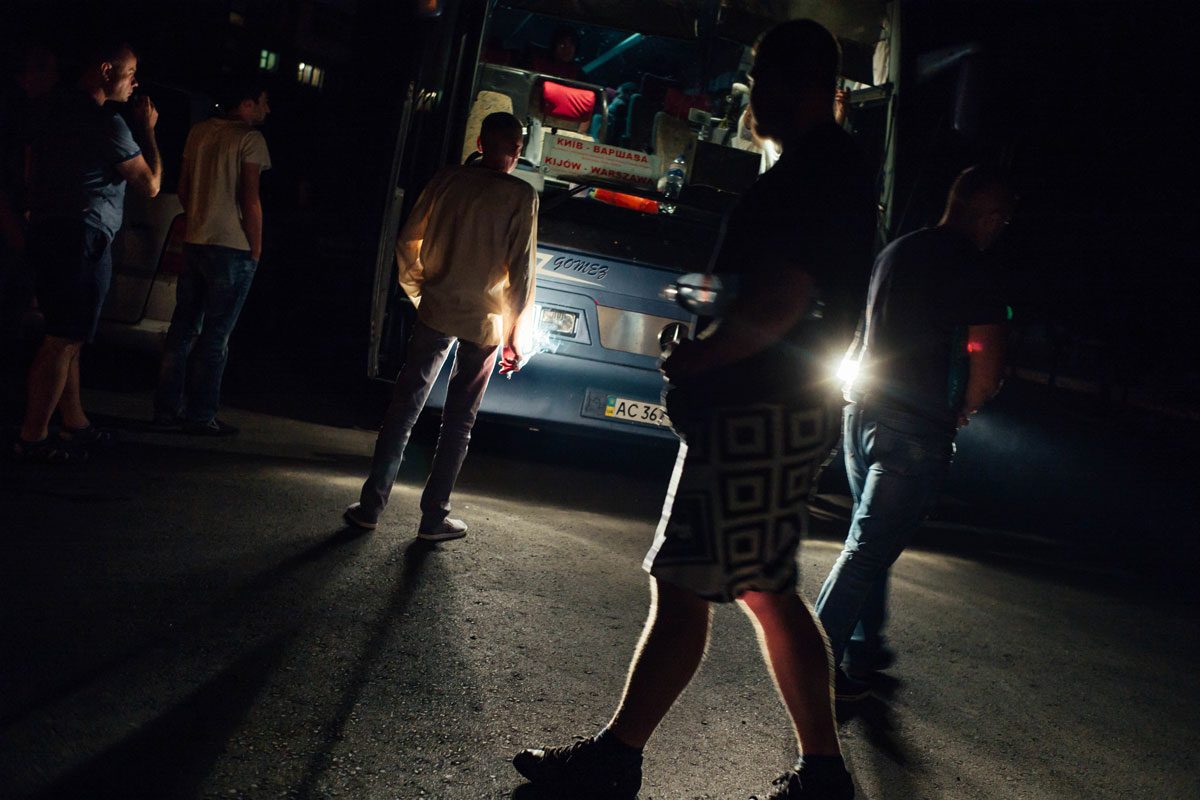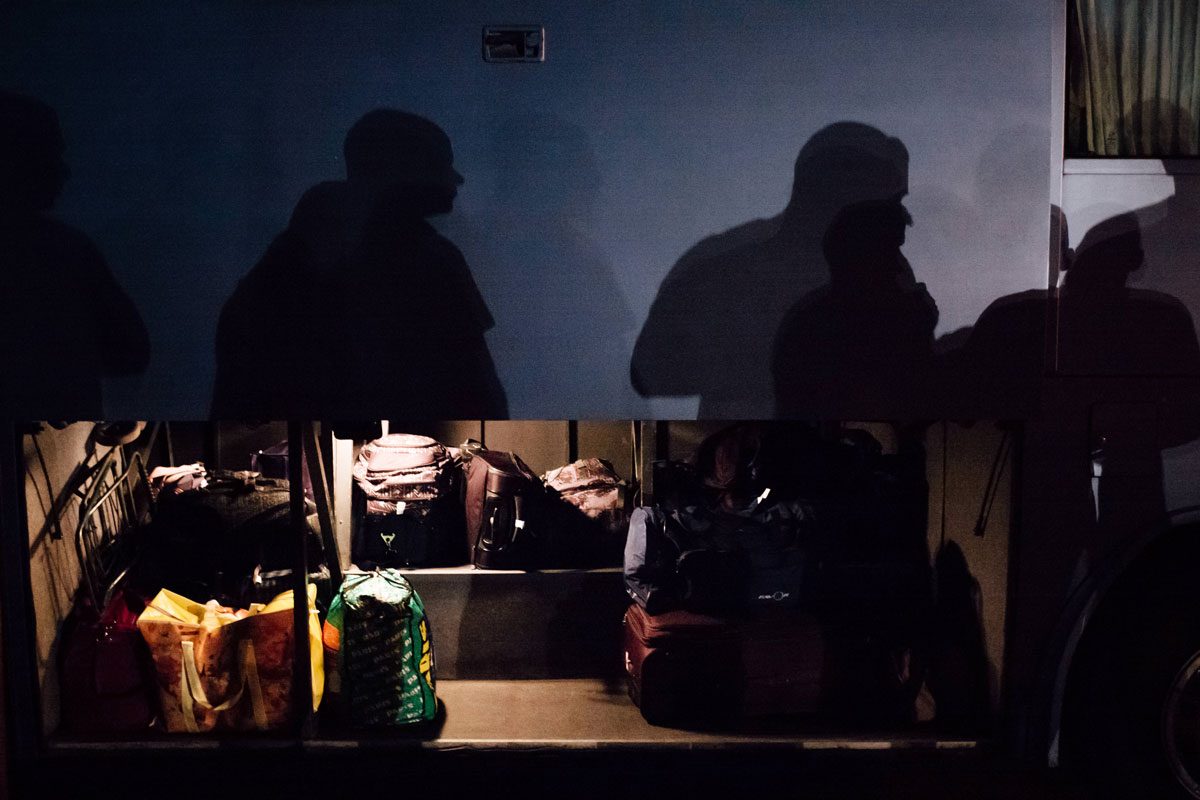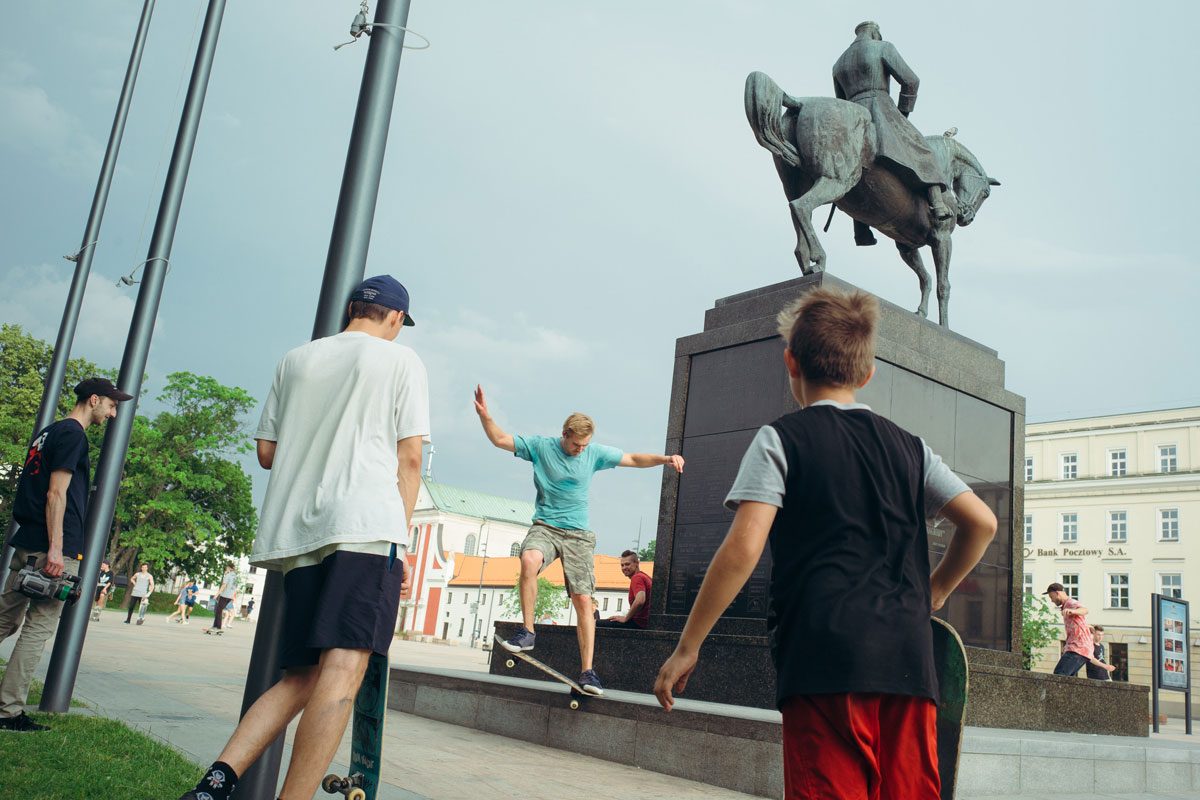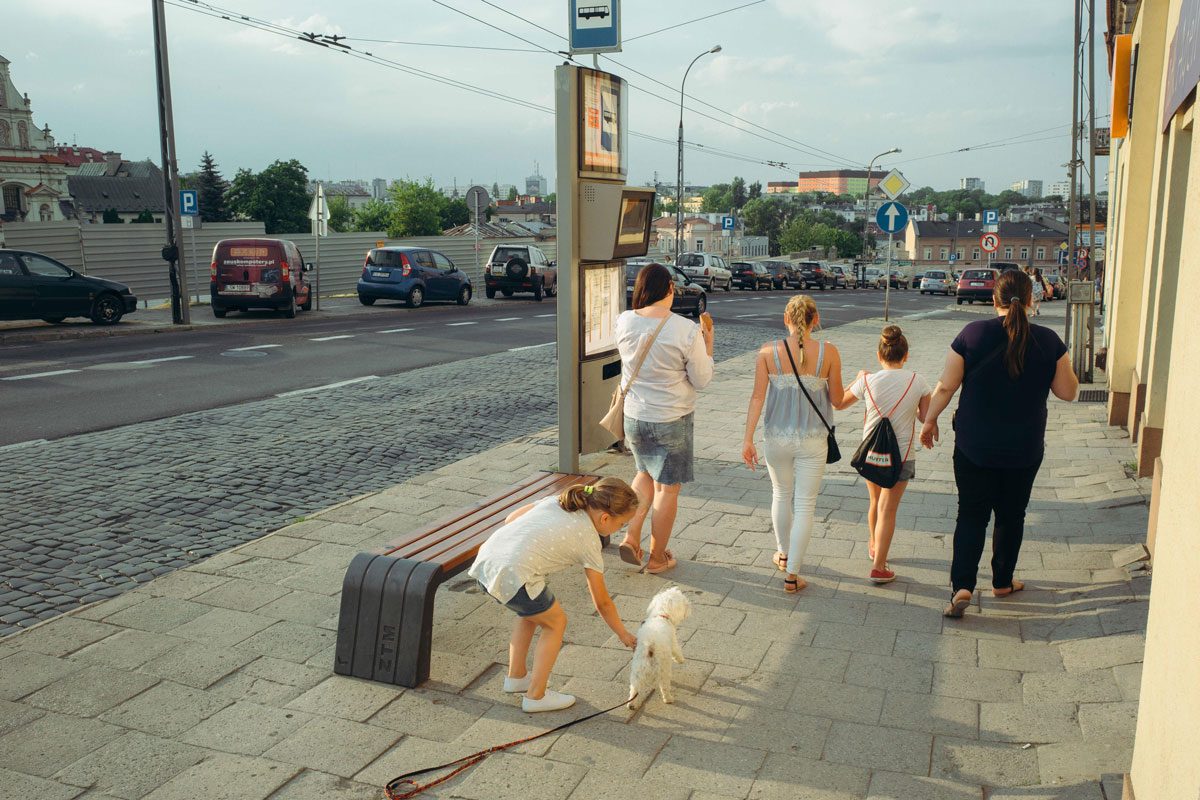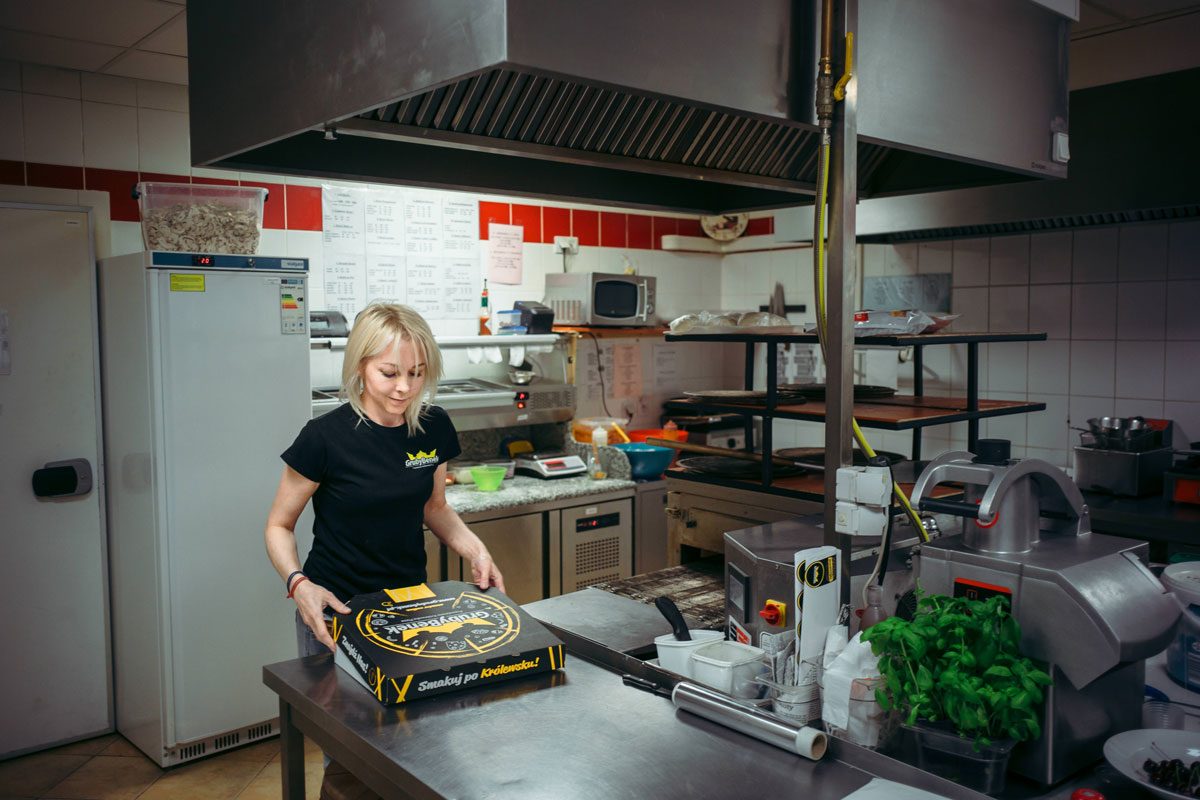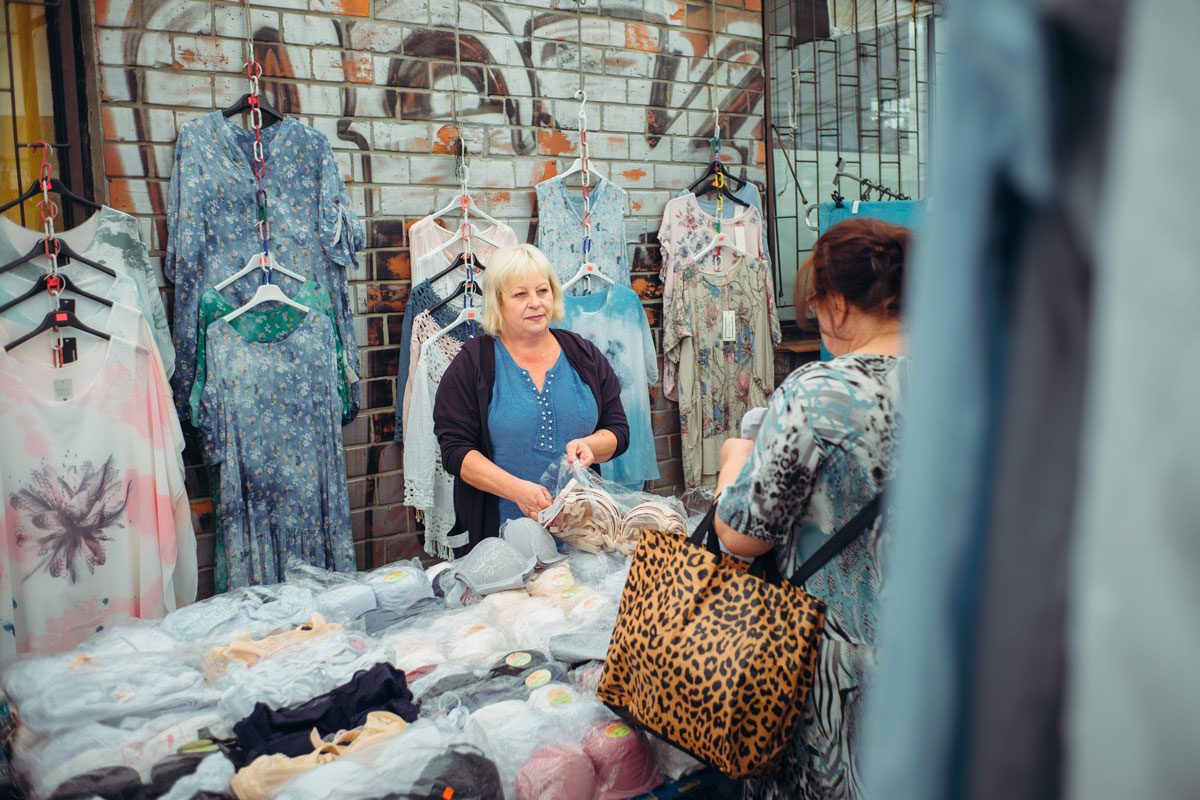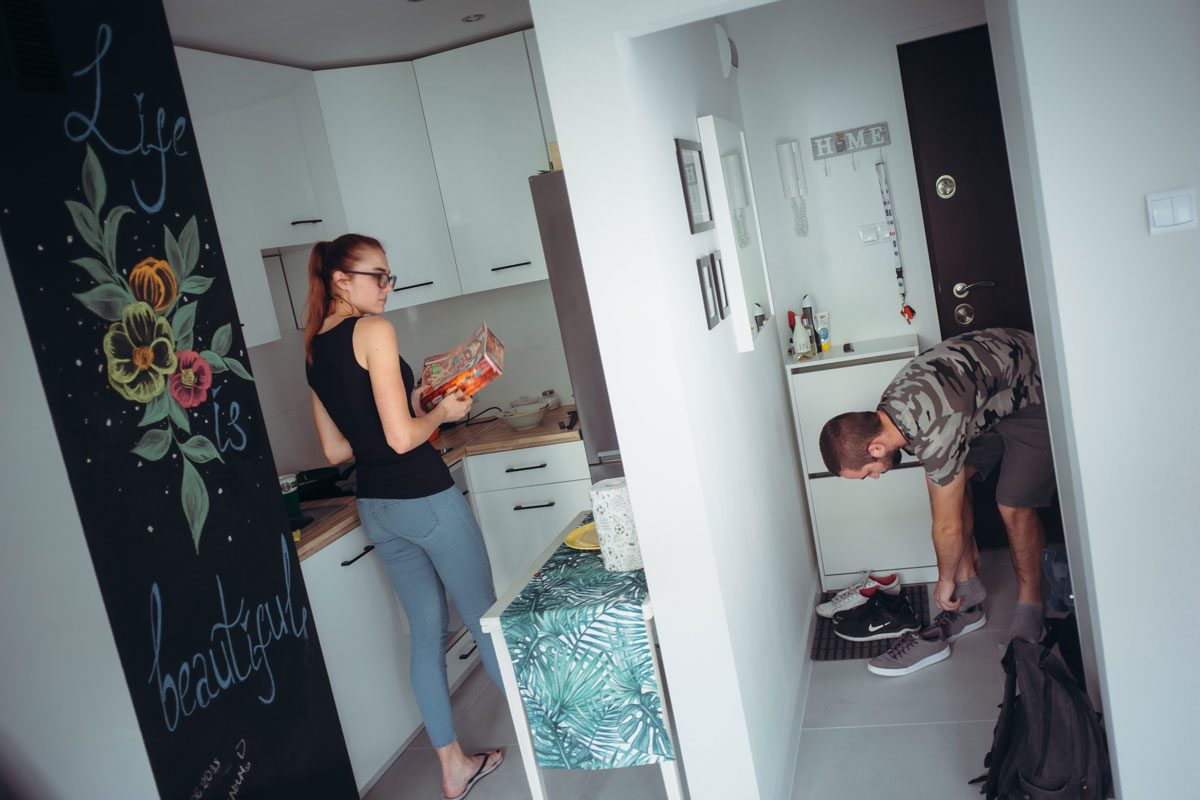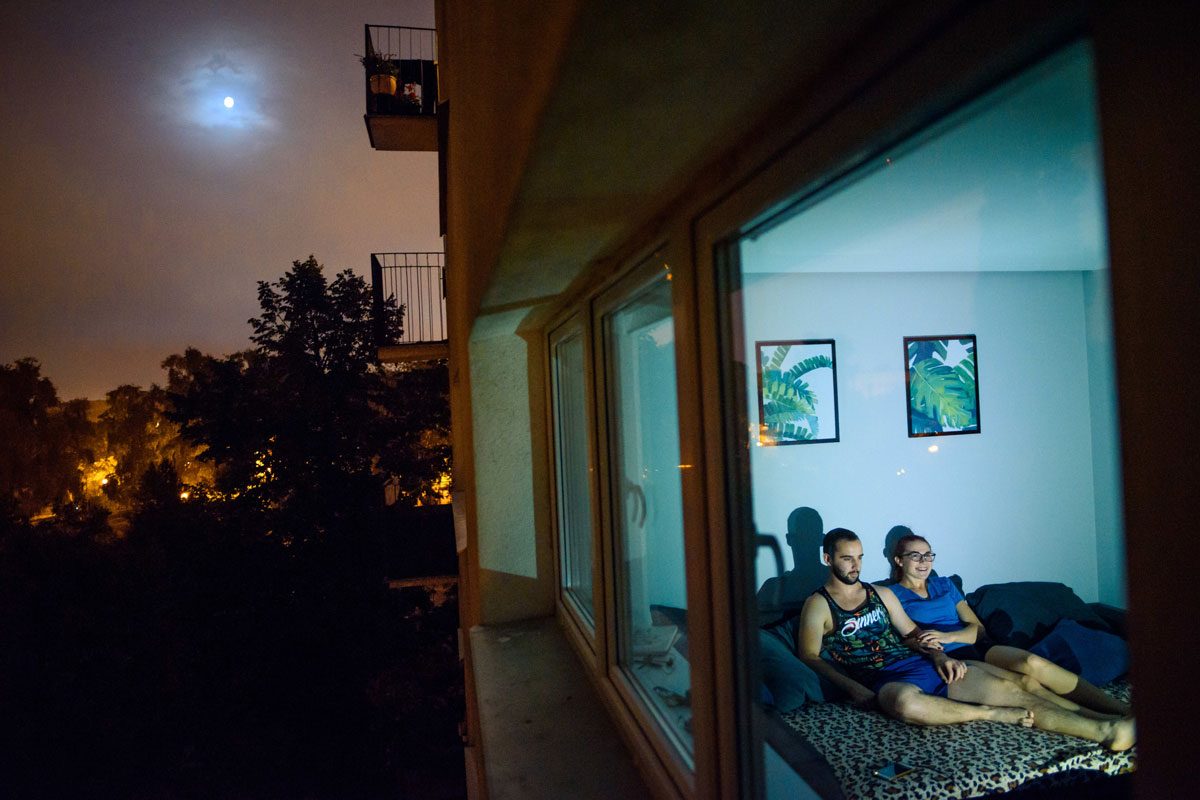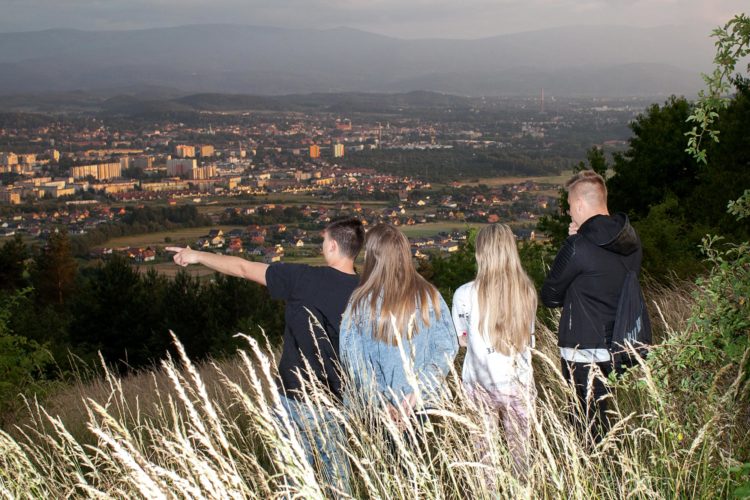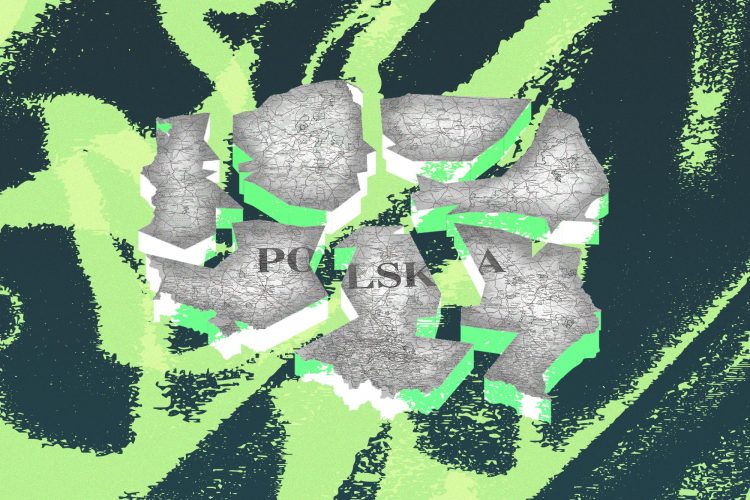Lublin and beyond: A new place to call home for Ukrainian Donbass migrants
Andriy Myrovych works for a Polish-Ukrainian NGO, here pictured walking to his office located in a suburb in Lublin © Gregor Fischer
For eastern Ukrainians, Lublin is the new place to be. Its low cost of living, high level of education and proximity to the Ukrainian border allow migrants fleeing the conflict back home and economic hardships that come with it find peace. All it takes is one arduous bus ride and the willingness to start over again.
A migration route in Ukraine has changed remarkably since 2014, when Crimea was annexed by the Russian Federation and the war broke out in Donbass. As a result, a large portion of Ukrainians from eastern and southern regions of the country set off to find work in Poland. Their numbers spiked from 6% to 20%, shifting the migrant flow from east to west over the last few years. In Russia, where many Ukrainian migrants used to go to find work before 2013, the number of Ukrainian migrants has dropped by over a third. Visa-free travel for Ukrainian citizens heading to the EU, implemented in 2017, facilitated the migration stream even more.
U-turn for a new life
“I used to go to Russia for work, as it was easier. I worked at my brother’s there. Now I don’t want to go there anymore. The route became more complicated for me since Russia stopped its transit trains via Ukraine. And I don’t want anyone to suspect anything about me,” one of the passengers on a bus from Kyiv to Warsaw explains. He’s from the Kyiv region and his friend is from Odessa. They are heading to Poland to find work for the first time. In their hands, the two men in their thirties tightly grasp transparent files holding what, to them, may be the most valuable documents they have: their passports and invitations to be legally employed.
The bus trip from Kyiv across the Polish border is quite lengthy and tiresome. Despite the fact that new train routes and low-cost flights from Ukraine to Poland have recently been introduced, many migrants and students still prefer using buses. Dozens with a few empty seats leave Kyiv for Poland every day. But as the journey unfolds, more and more passengers get on board.
This bus left Kyiv in the afternoon and only reached the border well after dark. Throughout most of the journey, passengers try to sleep, knowing that there will be exhausting border control checks upon entering Poland. This time, the border control takes at least five hours; it’s time for a sleepless night. Polish border guards meticulously check everyone’s papers, asking if those entering the country have sufficient funds. They also check bags for smuggled goods like cigarettes and vodka. Border guards on the Polish side act pretty tough throughout the process, often shouting at passengers, and keep them waiting locked up in a tiny customs room while they search the bus. Passengers complain to each other, but no one dares arguing with the border guards in fear of being denied access the next time they cross.
Lublin is the first stop after the border crossing, where large portions of passengers disembark. The city is the second largest of Lesser Poland, home to about 350,000 inhabitants. When stepping off the bus and looking past the bus station, a large orthodox cathedral stands tall. Behind it, the Taras Shevchenko square, Mohyla round and Lwowska street reference Ukrainian toponymics. Lublin has been a multicultural centre for a long time, and ethnic Ukrainians have long been part of the local community.
In the early 90s, economic migrants from western Ukraine started flooding Lublin and Poland. Newcomers could be seen then selling goods at local markets. 10 years later, they are still there, but Lublin has also turned into a hub of intellectual and cultural cooperation between the two countries. The community of ethnic Ukrainians in Lublin preserves and promotes national traditions, language and history. Since the war broke out in Ukraine, Lublin has also opened up for a military cooperation. It is now a base for a joint Lithuanian-Polish-Ukrainian military brigade.
Ukrainians in Lublin contribute to establishing healthy diplomatic ties between Ukraine and Poland, a relationship that has proved tense over the last few years due to historical traumas linking both countries.
Dream big
Ukrainian modern culture is very well presented in Lublin and fits naturally to a vibrant city’s festival life. The “Ukraine in the centre of Lublin” festival is one of the most well-known events that has been gathering both a Polish and a Ukrainian audience for many years now.
Maxim Vasiliev, a 19-year-old Ukrainian studying in Lublin, can be found at nearly every festival and cultural event in the city. He stands at the door of a modern art exhibition opening, looking like a fish in water. While wandering around halls and looking at the art pieces he greets several friends, also Ukrainians.
Maxim admits that the city has allowed him to rediscover Ukrainian music and culture. Mariupol, his hometown in the industrial Donbass region, was somewhat an outlier in terms of Ukrainian culture. In 2014, Mariupol became the frontline of a military confrontation between Russia and Ukraine. In 2015, the town was hit by Grad missiles killing 30 people and leaving over a hundred wounded. Maxim was in his final year of high school at the time.
“The war was near but it passed by. I try not to focus on that,” he says, feeling lucky that he and his family stayed safe. The war that took over his town gave him the extra push he needed to move to Poland.
“But I have always dreamed of something bigger, I wanted to leave Mariupol,” Maxim says.
Maxim is one of 3,500 Ukrainian students studying in Lublin, the largest group of foreign students in a town with five public universities. He is currently in his second year studying journalism, something he has wanted to do since he was in 9th grade. Back then, he kept a blog and already started taking pictures.
The young student rarely has free time, since he combines his volunteer jobs at venues that host cultural events with writing for a local media outlet. “That’s how I love to spend my time: having fun and working at the same time,” Maxim says, satisfied with his way of life in Lublin. Not typical for other students from Ukraine, he admits.
Here, the 19-year-old found something else that he later realised was very important for him. “I became more open, more free in expressing myself here. I stopped being afraid of crowds, of people trying to judge me. I can now respond brazenly if someone does not like the way I look. Often times, Ukrainians make such judgmental comments here, in Lublin,” Maxim confesses, admitting he feels more comfortable among Polish youth.
“I have one more year of studying ahead of me. If there are proposals to stay in Lublin, I will stay. If not, then I can go to any city and country and try to start something there,” he says.
Many Ukrainians who have finished their studies prefer to remain in Poland than to go back home. According to recent estimates, the number of young Ukrainian migrants in Poland has doubled, and the number of professional migrants has also increased.
“I love my country, but not the state system”
Researchers also note that more and more young people mention discontent with the political situation in Ukraine as one of the main reasons for seeking work abroad.
“I like Lublin, because I myself was from the easternmost city of Ukraine, with a population of just under half a million people. I know the ‘climate’ here, I feel comfortable here. I could grow old here,”
Valera Kozyuba, a 22-year-old graduate student from Luhansk, says. He ended up studying journalism and marketing in Lublin after his hometown had been occupied by Russian-backed militants, who proclaimed the so-called Luhansk People’s Republic there, forcing thousands of locals to move out.
“In a way, it all turned out for the best. If it were not for the war, studying in Kyiv would be my top achievement. I had never even considered studying abroad then,” Valera admits. Lublin was a perfect match for him in terms of the cost of living and education, but also with regards to the quality of life he’s found here.
Since his second year at the University College of Enterprise and Administration, Valera has taken on several jobs; from news editor to working at a supermarket in order to earn enough money to live. He is about to finish his student’s practice at the dean’s office, and is impressed by the way he was treated there.
“Everybody is so welcoming, ready to help. When I offered to change some procedures, they listened to me carefully. Something that wouldn’t be possible in Ukraine”, Valera explains, astonished.
In order to save money, he is also sharing his flat with two other students, both from western Ukraine. After graduating, he plans to find work in Lublin and get into a university in Warsaw, which is only three hours away by train. If it doesn’t work out, his plan B is to move back to Ukraine, to Kyiv. That prospect, however, would be a “step backwards” for Valera.
Sitting in a busy café in the conference centre of Lublin, Valera ends up talking about Ukrainian politics. He often goes back to visit Ukraine and is very much interested in what’s going on. It’s safe to say that he is anything but happy about the situation back home.
As a graduate student, he chose to research the history of press freedom in Ukraine for his thesis. “It is not a democracy,” Valera asserts, summarising his feelings about the state of freedom of speech in Ukraine. As a Ukrainian citizen from the east of the country, he’s not comfortable speaking about his opinion freely back home and is afraid to be called a “traitor”. “In my opinion, the country is moving in the wrong direction. If that weren’t the case, then I – and many other Ukrainians – wouldn’t be here,” Valera suggests.
“I love my country, but not the state system,” he adds. When asked if he wants to go back home to improve the situation, Valera says that he doesn’t feel as though he can fight for the problems in Ukraine. “The system will swallow me and spit me out.”
A place of no return
A poor economic situation in Ukraine has made elderly Ukrainians consider starting a new life in Poland. Tatiana and Andrey Parshikov from Luhansk came to Poland when they had failed to settle in Lviv, a western Ukrainian city, where they had fled from the war.
The Parshikovs chose Lublin for relatively low start-up costs, a faster registration process and its proximity to the Ukrainian border. Since 2016, they’ve been running a pizzeria here. It is a small and neat place outside the city-centre. Tatiana works in the kitchen, Andrey delivers pizzas. They have several Polish employees, since the Ukrainians they hired did not stay for long. Tatiana says she struggles to find a good team of people to work in the pizzeria.
Tatiana and Andrey dedicate most of their time to run their relatively new business. They hardly find time to see their rare friends here, and have no time to find new ones. To fill the communication gap, Tatiana joined an online Russian-speaking women-only Facebook group in Lublin organised by Maria Miroshnichenko, a Ukrainian from Dnipro.
Lublin reminds the Parshikovs of the Luhansk they miss: small, green and cosy.
“If it were not for the war, we would have never left Luhansk. There, we had everything we had worked for over time: a successful business, a stable financial situation, a flat. Twice a year, we would go on vacation abroad,” says Tatiana with a heavy sigh.
She still keeps photos of their warehouse premises, which was heavily damaged by shrapnel. Tatiana says they tried to restore the warehouses in 2015, hoping that everything would end soon thereafter, as many others had done. But after a while, they realised that the situation wouldn’t change for a long time, and there were no perspectives for them in Luhansk anymore. And now Luhansk is a place of no return for them, they say.
Tatyana is 44 years old and Andrey 50, and they both admit that starting from scratch in Poland was not easy. “As we began our life together, we started our business, we did not sleep at nights and worked. Here, we have [to do] it all over again,” Tatiana says to her husband. “The story is repeating itself over and over again, like a spiral,” he agrees.
Further to the West
Before 2013, an overwhelming number of migrants crossing over to Poland from Ukraine were seasonal workers. These days, the number of migrants looking for permanent employment is on the rise. A lot of them are looking to more western Polish cities, especially the capital Warsaw, for long-term job opportunities.
“Lublin looks so much like Ukraine!”
“Lublin looks so much like Ukraine!”,notices Alexey Ulichniy, a 26-year-old from Kramatorsk, a town in Donbass that was occupied by Russian-backed militants for three months in 2014. After heavy fightings, the town is back under Ukrainian control. Alexey and his 19-year-old girlfriend from Nikolayev, Marina Kokhanevych, came to Lublin to sort out Marina’s documents. After a couple of hours, they will be going back to Warsaw where they both live and work.
Alexey works in a warehouse packing medicine. He earns more money and has better working conditions than at his previous job at a furniture factory in a small town near Wroclaw. In between the two jobs, he had to go back home. While waiting for his next contract, he took an opportunity to go to work in Russia for couple of months.
“I thought: ‘Why not?’ I have never been to Russia. Now I have and I do not want to go there anymore,” says Alexey, walking around Lublin’s city centre. Jobs in Kramatorsk – his home town – didn’t suit him either. “You either have money, or you have free time. You can’t have both. I also got fed up with Kramatorsk. I just wanted something new,” Alexey explains.
Alexey says he is in Poland not just to earn the money, but to really start living his life. This is where he met his girlfriend Marina, who is now working in a café kitchen.
As it stands, they both have enough free time and money to enjoy themselves. They go to music festivals and enjoy riding bicycles around Warsaw, something that they would find difficult in Ukraine as there is no infrastructure to do so. They love meeting their Kramatorsk friends who have also settled in Warsaw. Alexey and Marina are renting a comfortable “kavalerka” flat, Polish for a tiny studio, and plan on buying a TV set soon.
Alexey helped his brother, who is a professional welder, get a job in Poland. His uncle, who is also a welder, is also coming to Poland soon. Marina’s mother has already worked in Poland for three months. Now she is looking forward to coming back here again.
“When we go to Ukraine, we feel like guests. When we go to Poland, it feels like home,” the couple says, certain that they will not be returning to Ukraine anytime soon.
Unlike them, their friend Andrey Pavlenko, 28, also from Kramatorsk, who worked in Jelenia Gora as a milling machine operator, decided to go back home. Although his job was well-paid and he considered going further to Germany, he thought it would be better for him in Ukraine. “Because I did not feel like I could realise my potential in Poland,” Andrey explains. Now he is engaged in volunteer camp activities in Ukraine. Later on, he will try to find work in the public sector or open his own business.
In the meantime, the administration of the Lviv region in western Ukraine is thinking of ways to get workers back home. Their focus is to create more jobs, but they also promote jobs that allow migration within companies that have offices both in Poland and in Ukraine. You can see banners with “we are waiting for you at home” written on them in Lublin, clearly addressed to Ukrainians. This time around, it’s an ad campaign from a Japanese manufacturing company called Fujikura, one of the biggest employers in western Ukraine.
According to estimates, there are around 1.5 to 2 million Ukrainians working and studying in Poland. But going from east to west is not only a trend for Ukrainian migrants. Many of Poland’s own citizens moved outside the country in search for better jobs.



